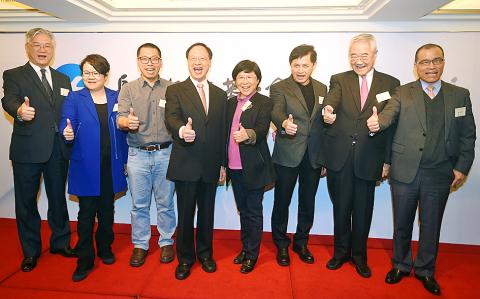Former premier Jiang Yi-huah (江宜樺) yesterday announced the establishment of a foundation aimed at seeking a “way out” for Taiwan and linking Taiwanese youths with the international community.
He denied that the move was a precursor to staging a political comeback.
With Jiang as president, the newly founded Fair Winds Foundation’s board of directors includes many former Cabinet members of former president Ma Ying-jeou’s (馬英九) administration, including former minister of Mainland Affairs Council Andrew Hsia (夏立言), former minister of National Development Council Kuan Chung-ming (管中閔), former minister of culture Lung Ying-tai (龍應台) and former minister of transportation and communications Yeh Kuang-shih (葉匡時), who is also the chief executive officer.

Photo: Liao Chen-huei, Taipei Times
“After resigning as premier in December 2014, I went to the US as a visiting scholar before taking on a teaching job in Hong Kong last year. Spending two years abroad allowed me to look at what happened in Taiwan from an appropriate distance,” Jiang said in his speech.
Jiang said his heart had been wrenched by the constant internal friction at home, which prompted him to approach a group of like-minded individuals to jointly roll up their sleeves and do something to change the situation.
Reiterating that the foundation is not a personal platform, Jiang said it is an organization through which he intends to work with other organizations and link young people with the international community.
He said he plans to achieve the goals through policy research, large-scale speeches, forums and international student camps.
This year’s events include a forum on Feb. 19 in Taipei where Kuan and four young people are to talk about Taiwan’s future, and in April a speech by US political scientist Francis Fukuyama on democratic governance.
“Former vice president Vincent Siew (蕭萬長) is also due to give a speech to share his experiences as one of Taiwan’s economic pioneers and talk about future economic situations across the Taiwan Strait,” Jiang said.
The exact time and content of Siew’s speech are still being discussed, he said.
The foundation’s establishment came as major political parties are gearing up for the local election next year, sparking speculation that Jiang is seeking a political comeback and might join the race.
“It has nothing to do with elections. We merely want to do something based on our shared ideals,” Jiang said, adding that vying for political office is not the only way to serve the community.
Jiang also denied he had consulted with or sought the opinions of Ma and former National Security Council secretary-general King Pu-tsung (金溥聰) about setting up the foundation.
Asked why Chinese Nationalist Party (KMT) Vice Chairman Hau Lung-bin (郝龍斌) was the only political figure attending the founding ceremony, Jiang said he did not invite Ma, former vice president Wu Den-yih (吳敦義) or any leaders of political parties due to the foundation’s cultural and educational nature and limited seating at the ceremony.
“Hau volunteered to come after hearing about news of the foundation’s establishment,” Jiang added.
Hau and Wu are contenders in the KMT’s next chairmanship election on May 20.

‘DENIAL DEFENSE’: The US would increase its military presence with uncrewed ships, and submarines, while boosting defense in the Indo-Pacific, a Pete Hegseth memo said The US is reorienting its military strategy to focus primarily on deterring a potential Chinese invasion of Taiwan, a memo signed by US Secretary of Defense Pete Hegseth showed. The memo also called on Taiwan to increase its defense spending. The document, known as the “Interim National Defense Strategic Guidance,” was distributed this month and detailed the national defense plans of US President Donald Trump’s administration, an article in the Washington Post said on Saturday. It outlines how the US can prepare for a potential war with China and defend itself from threats in the “near abroad,” including Greenland and the Panama

A wild live dugong was found in Taiwan for the first time in 88 years, after it was accidentally caught by a fisher’s net on Tuesday in Yilan County’s Fenniaolin (粉鳥林). This is the first sighting of the species in Taiwan since 1937, having already been considered “extinct” in the country and considered as “vulnerable” by the International Union for Conservation of Nature. A fisher surnamed Chen (陳) went to Fenniaolin to collect the fish in his netting, but instead caught a 3m long, 500kg dugong. The fisher released the animal back into the wild, not realizing it was an endangered species at

The Chinese Nationalist Party (KMT) is maintaining close ties with Beijing, the Democratic Progressive Party (DPP) said yesterday, hours after a new round of Chinese military drills in the Taiwan Strait began. Political parties in a democracy have a responsibility to be loyal to the nation and defend its sovereignty, DPP spokesman Justin Wu (吳崢) told a news conference in Taipei. His comments came hours after Beijing announced via Chinese state media that the Chinese People’s Liberation Army’s Eastern Theater Command was holding large-scale drills simulating a multi-pronged attack on Taiwan. Contrary to the KMT’s claims that it is staunchly anti-communist, KMT Deputy

The High Prosecutors’ Office yesterday withdrew an appeal against the acquittal of a former bank manager 22 years after his death, marking Taiwan’s first instance of prosecutors rendering posthumous justice to a wrongfully convicted defendant. Chu Ching-en (諸慶恩) — formerly a manager at the Taipei branch of BNP Paribas — was in 1999 accused by Weng Mao-chung (翁茂鍾), then-president of Chia Her Industrial Co, of forging a request for a fixed deposit of US$10 million by I-Hwa Industrial Co, a subsidiary of Chia Her, which was used as collateral. Chu was ruled not guilty in the first trial, but was found guilty